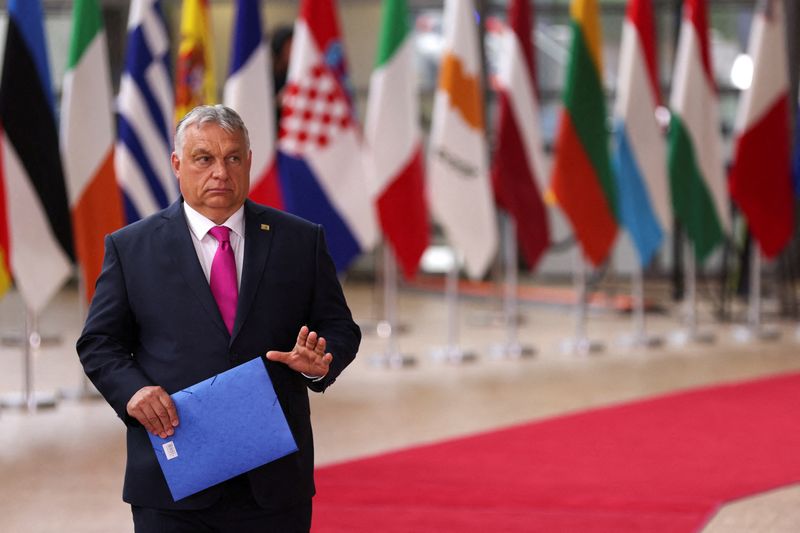By Gergely Szakacs
BUDAPEST (Reuters) - Hungary's price caps on fuel, some basic foods and energy could stay in place for a longer period if the war in Ukraine is entrenched, sustaining high inflationary pressures, Prime Minister Viktor Orban said on Friday.
Inflation has been rising sharply across Central Europe since Russia's invasion of Ukraine amplified already strong price pressures following the coronavirus pandemic, prompting central banks to raise interest rates sharply.
Orban's government set a limit on fuel prices in mid-November and followed up with caps on some food staples in February. The measures, which have lopped 5 to 6 percentage points off headline inflation, are due to expire next month.
"There is a high likelihood that the war becomes protracted and the year 2023 will also be full of uncertainty and sorrow," Orban told public radio. "The world will be suffering from the war and its economic consequences."
Orban said without the measure capping retail fuel prices at 480 forints ($1.29) per litre, market prices for fuel would be around 700 to 900 forints.
The scope of the fuel price cap was recently narrowed to cars with a Hungarian licence plate, triggering conflict with the European Union, while Hungarian energy group MOL on Thursday called for the gradual phasing out of the measure.
MOL Chairman and Chief Executive Zsolt Hernadi told local media that phasing out the fuel price cap gradually would be necessary to ensure the long-term safety of supply.
"It all depends on the war. If there is war, then there is war inflation," Orban said. "If there is peace, then we can phase out these measures more quickly. If there is war, then we cannot, or can only do so very slowly."
Asked about the EU calling on Hungary to suspend discriminatory fuel pricing against vehicles with foreign licence plates or risk being taken to court, Orban said there was no one-size-fits-all solution to the problem.
"This is an extraordinary situation and we need to do what such situations require," Orban said. "In times like this it is mandatory to deviate from general regulations."
Orban said without the price caps, Hungarian inflation, which accelerated to 10.7% in May, would be running at 15% to 16%.

He added that a European Union embargo on Russian gas imports would destroy the European economy, already grappling with surging inflation due to higher energy prices.
($1 = 371.84 forints)